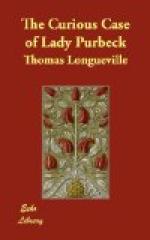When she reached it, she was told that the Lord Keeper was unwell and in his room, asleep. She persuaded “the door-keeper” to take her to the sitting-room next to his bedroom, in order that she might be “the first to speak with him after he was stirring.” The “door-keeper fulfilled her desire and in the meantime gave her a chair to rest herself in.” Then he most imprudently left her, and she had not been alone long when “she rose up and bounced against my Lord Keeper’s door.” The noise not only woke up the sleeping Bacon, but “affrighted him” to such an extent that he called for help at the top of his voice. His servants immediately came rushing to his room. Doubtless he was relieved at seeing them; but his feelings may have been somewhat mixed when Lady Elizabeth “thrust in with them.” He was on very friendly terms with her; but it was disconcerting to receive a lady from his bed when he was half awake and wholly frightened, especially when, as the correspondent describes it, the condition of that lady was like that of “a cow that had lost her calf.”
The upshot of this rather unusual visit was that Lady Elizabeth got Bacon’s warrant, as Lord Keeper, and also that of the Lord Treasurer “and others of the Council, to fetch her daughter from the father and bring them both to the Council.”
At that particular time Bacon had just made a blunder. He was well aware of Buckingham’s high favour with the King; but he scarcely realised its measure. Indeed, since he had seen him last, and during the time that the King had been in Scotland, Buckingham’s influence over James had increased enormously. It is true that Bacon had enlisted the services of Buckingham to defeat Coke, and that he had used him as a tool to secure the office of Lord Keeper: but, as the occupier of that exalted position, he considered himself secure enough to take his own line, and even to offer Buckingham some fatherly advice, as will presently appear.
Bacon now made another attack upon his enemy by summoning Coke before the Star Chamber on a charge of breaking into a private house with violence. On receiving this summons, Coke wrote to Buckingham, who was with the King in the North, complaining that his wife, the Withipoles, and their confederates, had conveyed his “dearest daughter” from his house, “in most secret manner, to a house near Oatland, which Sir Edmund Withipole had taken for the summer of my Lord Argyle.” Then he said: “I, by God’s wonderful providence finding where she was, together with my sons and ordinary attendants did break open two doors, & recovered my daughter.” His object, he said was, “First & principally, lest his Majesty should think I was of confederacy with my wife in conveying her away, or charge me with want of government in my household in suffering her to be carried away, after I had engaged myself to his Majesty for the furtherance of this match.”




